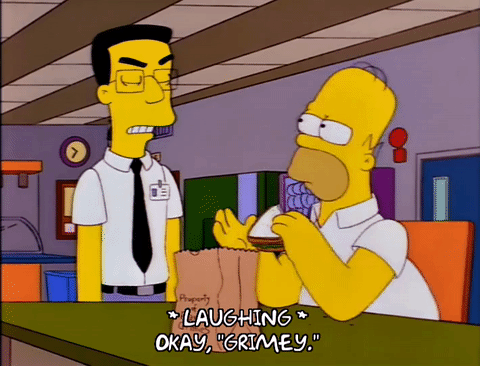Who breaks a shithead upon a wheel? In extremely reluctant defence of Darren Grimes
Or Why I Don't Want Darren Grimes To Be A Martyr... Again

It’s not so much that I hate Darren Grimes, more that he represents everything venal, banal, and bigoted about the current media environment. The stooge’s stooge, he spends his time finding culture war stories to get faux-outraged about then wanking for coins across 24-hr news channels, and the kind of radio stations whose main listenership is men whose faces become ever more beetroot red as the day goes on.
As I have written before, Grimes is a kind of human shield for people far richer and more malevolent than he has the capacity of brain or balls to be. He is a megaphone for the thoughts of think-tank bastards, hideous hedge fund ghouls, and all manner of far-right shadows. That he believes he is a free-speech radical and, of all things, a journalist is just part of the grift he is so deeply embedded within.


And yet, the news that the Metropolitan Police has decided to interview Grimes about accusations that he committed a public order offence — inciting racial hatred — by publishing a podcast (and video interview) with Dr David Starkey, in which the academic asserted that slavery was not genocide because “there are so many damn blacks”, is ridiculous. In a media environment where racism and abusive practices of all kinds are disgustingly common, picking off Grimes is like trying to take down Pablo Escobar by pulling a street dealer in.
Grimes wants to be a player and incidents like this one simply play into his dreams and those of other bottom feeders like Toby Young’s Free Speech ‘Union’, which has swung into action to support him. Grimes should not have published the podcast, but the event had passed into the history of unpleasant events he has been involved with. The interview was published on July 2 and was immediately followed by a storm of justified criticism. Grimes apologised — however hollow that may have been — and Starkey lost a slew of positions and book deals as a result of his racist comments.
Grimes — practically salivating at the attention — has released a statement to the press which reads in part: “At a time when many in our country are facing uncertainty and financial hardship, I cannot imagine a more contemptible way for the Metropolitan Police to abuse taxpayers' money and the trust of citizens then by investigating this vexatious claim.”
The Met has not charged Grimes with any crime and has, at this point, simply asked him to attend an interview. I don’t believe any charges will occur. The CPS has better things to do with its time right now and there is unlikely to be any reasonable chance of a conviction for the named offence or any other. Grimes didn’t make the comments himself, despite nodding along like Churchill the Insurance Dog on a parcel shelf, and while he published the material he made a swift apology to save his skin.

In pursuing Grimes, even in a perfunctory manner, the Met is playing into the perception that free speech in the UK is under threat for right-wing people. That’s a canard. People like Darren Grimes, Toby Young and Douglas Murray are rarely off the news channels and radio stations, while also having significant platforms through social media and YouTube. The Met’s decision to pick up a complaint sent to Durham Police makes them look ridiculous and allows Grimes to posture as a free speech warrior saddling up once again to ride into battle.
In his Epistle to Dr Arbutnot, written in January 1735, Alexander Pope wrote against punishing satirists for their attacks on powerful people: “Who breaks a butterfly upon a wheel?” The quote was used with startling effect 232 years later by William Rees-Mogg, father of Jacob, and then editor of The Times, to come to the defence of Mick Jagger and Keith Richards who had been imprisoned on trumped-up drug charges.
In concluding his defence of the Rolling Stones — a pair of men he had almost nothing in common with and for whom he had no shortage of disdain — Rees-Mogg wrote:
“There are cases in which a single figure becomes the focus for public concern about some aspect of public morality. The Stephen Ward case, with its dubious evidence and questionable verdict, was one of them, and that verdict killed Stephen Ward. There are elements of the same emotions in the reactions to this case.
If we are going to make any case a symbol of the conflict between the sound traditional values of Britain and the new hedonism, then we must be sure that the sound traditional values include those of tolerance and equity. It should be the particular quality of British justice to ensure that Mr. Jagger is treated exactly the same as anyone else, no better and no worse.
There must remain a suspicion in this case that Mr. Jagger received a more severe sentence than would have been thought proper for any purely anonymous young man.”
53 years on from Rees-Mogg’s leader column, I’ll paraphrase his words here:
If we are going to make any case a symbol of the conflict between the controversialist right and the principles of free speech tempered by the protection of minority groups, then we can’t allow ourselves to be framed as censors and bullies. It should be the particular quality of modern justice that Mr Grimes is treated exactly the same as anyone else, no better and no worse.
There must remain a suspicion in this incident that Mr Grimes has received a more severe level of attention than would have been thought proper of any purely anonymous young idiot.
Who breaks a shithead upon a wheel? And furthermore, who falls into the trap of giving him precisely the publicity he craves with every straining sinew of his bitter little body?

